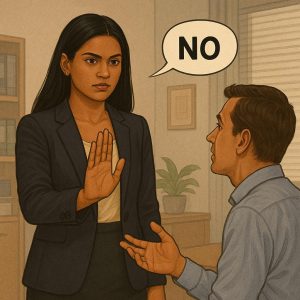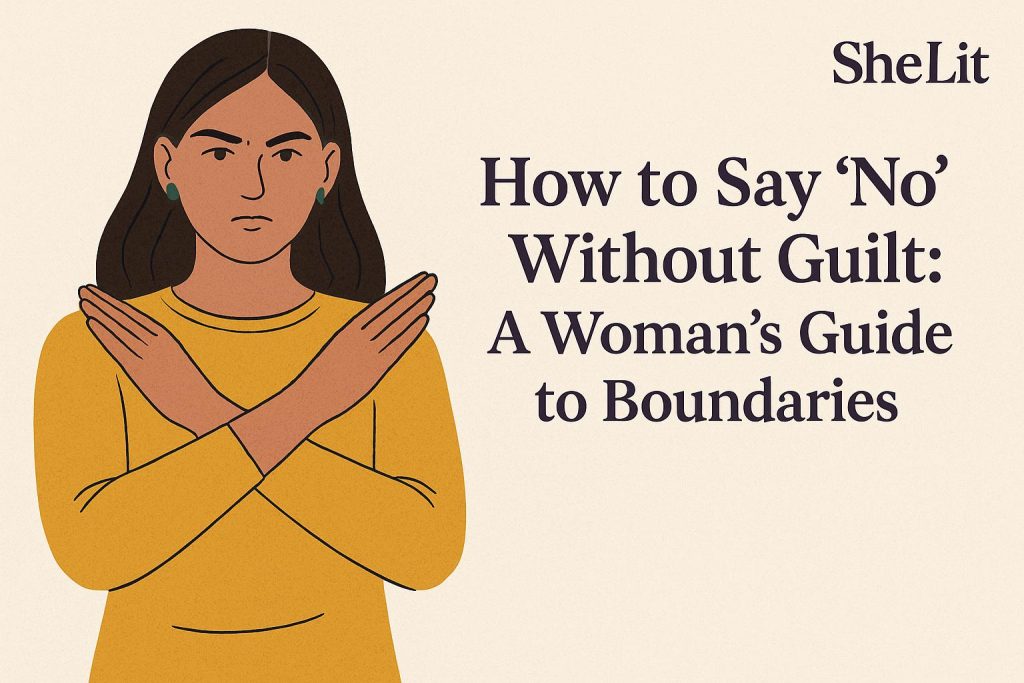In a world where women are often socialized to please others, saying “no” can feel like a burden—something to apologize for. But setting boundaries isn’t just about personal comfort—it’s about safety, empowerment, and survival. For women, especially in environments where asserting yourself can invite backlash or be misinterpreted, learning to say “no” confidently is a critical self-defense skill.
This guide explores why “no” is your right, how to say it without guilt, and how it can be a powerful tool in protecting your physical, emotional, and mental well-being.
Why Saying ‘No’ Is a Safety Issue
Too often, women ignore their instincts because they don’t want to appear rude or make someone uncomfortable. This hesitation is dangerous. Whether it’s declining a ride from a stranger, avoiding a secluded meeting, or resisting unwanted physical contact, saying “no” without guilt can prevent risky situations and even save lives.

Women have every right to:
- Say no to anything that makes them uncomfortable.
- Walk away from a situation that feels unsafe.
- Refuse to justify or explain their decisions.
- Set limits with friends, family, colleagues, and strangers alike.
The Cultural Conditioning Behind Guilt
From a young age, girls are often taught to be “nice,” “obedient,” and “accommodating.” When they express disagreement or assertiveness, they’re labeled “difficult” or “bossy.” These labels create guilt whenever a woman tries to draw the line.
Understanding that this guilt is learned is the first step in unlearning it. You don’t owe anyone your time, your energy, or your compliance—especially at the cost of your safety or peace.
7 Empowering Ways to Say ‘No’ Without Guilt
Here’s how you can build strong boundaries while protecting yourself:
- Use Direct Language
“No, I’m not comfortable with that.”
“I’m not available.”
Avoid over-explaining or justifying. A clear and firm “no” is enough.
- Trust Your Instincts
If something feels off, it probably is. Women often sense danger before it’s visible. Don’t ignore that gut feeling just to avoid awkwardness.
- Practice Assertive Body Language
Stand tall. Maintain eye contact. Keep your voice steady. Your body communicates confidence, and that alone can deter potential threats.
- Set Digital Boundaries Too
You don’t have to respond to late-night messages, share your location, or stay in uncomfortable online conversations. Block, mute, or report without guilt.
- Say No to Emotional Guilt-Tripping
If someone reacts with anger or manipulation when you say no, that’s on them—not you. Their discomfort is not your responsibility.
- Create a Safety Plan
Have a friend or emergency contact on standby when you go out. Learn self-defense moves. Download safety apps. Boundaries backed by action are more powerful.
- Practice Saying No in Low-Stakes Situations
The more you say no to small things (like declining a favor or an invitation), the easier it becomes to say no when it really counts.
Real-Life Scenarios Where ‘No’ Is Crucial
- Dating Safety: You don’t have to go home with someone just because the date went well.
- Workplace Harassment: You can say no to uncomfortable jokes, invasive questions, or unwanted attention—even from seniors.
- Public Spaces: If someone follows or confronts you, loudly say “No” and seek help immediately. Public assertiveness can be a deterrent.
Final Words: ‘No’ Is a Full Sentence
Saying “no” is not rude. It’s not selfish. It’s necessary.
As women, we must normalize the idea that our safety comes before social niceties. Saying “no” without guilt is a declaration of self-respect and an essential step toward a safer, more empowered life.
Let’s teach our daughters, sisters, and friends that their boundaries are valid. Let’s create a culture where a woman’s “no” is respected the first time—no explanations needed.
At SheLit, we stand with every woman learning to reclaim her voice. Your safety is your right. Your boundaries are your strength.
Sucheta Kapoor ( Psychologist )

